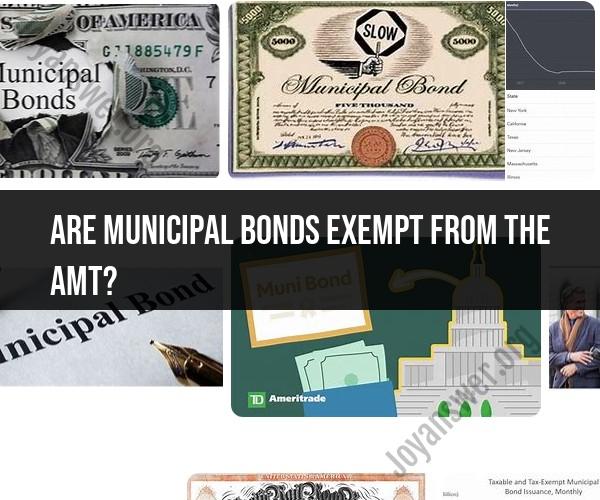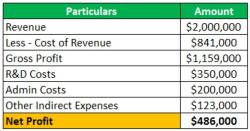Are municipal bonds exempt from the Amt?
Municipal bonds, also known as "munis" or "municipal securities," are often exempt from the Alternative Minimum Tax (AMT) in the United States. The AMT is a separate tax system that was designed to ensure that high-income individuals who might otherwise benefit from various tax deductions and credits still pay a minimum amount of federal income tax. The exemption of municipal bonds from the AMT is one of the incentives provided to encourage investment in these bonds, particularly by individual investors in higher tax brackets.
Here's how the exemption of municipal bonds from the AMT works:
Regular Income Tax vs. AMT: When you calculate your federal income tax liability, you initially compute it under the regular income tax system, which allows you to take advantage of various deductions and exemptions, including those related to interest income from municipal bonds.
AMT Calculation: However, if your regular income tax liability falls below a certain threshold and your income includes certain tax preference items (such as certain tax-exempt interest income from private activity bonds), you may be subject to the AMT.
Municipal Bond Exemption: The interest income from most municipal bonds is typically exempt from both regular income tax and the AMT. This means that even if you are subject to the AMT, you generally won't owe taxes on the interest income you earn from municipal bonds.
Exceptions: It's important to note that not all municipal bonds are automatically exempt from the AMT. Private activity bonds and certain other types of municipal bonds may be subject to the AMT, especially if they are used to finance projects that are considered tax preference items.
State and Local Tax Implications: While municipal bond interest income may be exempt from federal income tax, it's essential to check the tax rules in your specific state. Some states may still tax the interest income from out-of-state municipal bonds, although they often provide exemptions for in-state municipal bonds.
Individual Circumstances: Individual circumstances, including your overall income, deductions, and credits, can impact whether you are subject to the AMT. It's advisable to consult with a tax professional or use tax software to determine your tax liability accurately.
In summary, municipal bonds are generally exempt from the Alternative Minimum Tax (AMT) at the federal level, making them an attractive investment option for individuals seeking tax-advantaged income. However, it's essential to be aware of the specific tax rules that apply to your situation and to consider your state's tax implications when investing in municipal bonds. Tax laws can change over time, so it's a good idea to stay informed about any updates or changes that may affect your tax obligations.
Municipal Bonds and the AMT: Exemption and Tax Considerations
Municipal bonds are generally exempt from federal income tax, but they may be subject to the alternative minimum tax (AMT). The AMT is a parallel tax system that is designed to ensure that all taxpayers pay a minimum amount of tax, regardless of the deductions and credits they claim.
Tax Implications of Municipal Bonds: AMT Exemption Explained
Most municipal bonds are exempt from the AMT. However, there are a few exceptions, such as:
- Private activity bonds: These bonds are used to finance private businesses or projects.
- Arbitrage bonds: These bonds are used to invest in taxable securities.
- Certain bonds issued by US territories and possessions: These bonds may be subject to the AMT if the taxpayer is a resident of a state that does not conform to the federal AMT.
Municipal Bonds and Alternative Minimum Tax (AMT): What You Should Know
If you are considering buying municipal bonds, it is important to understand the AMT implications. If you are subject to the AMT, you may not be able to deduct the interest income from your municipal bonds. This could reduce the attractiveness of municipal bonds for you.
To determine if you are subject to the AMT, you will need to complete Form 6251. This form will calculate your AMT liability and determine if you owe more tax under the AMT than under the regular tax system.
If you are subject to the AMT, you may still want to consider buying municipal bonds. Municipal bonds can still be a good investment for AMT taxpayers, especially if they are in a high tax bracket.
Here are some things to keep in mind if you are an AMT taxpayer and considering buying municipal bonds:
- Choose bonds that are exempt from the AMT.
- Consider the yield on the bonds. AMT taxpayers will need to look for bonds with higher yields to compensate for the fact that the interest income may not be deductible.
- Consider the credit quality of the bonds. AMT taxpayers should avoid bonds that are issued by risky borrowers.
If you have any questions about the AMT implications of municipal bonds, you should consult with a tax advisor.












